| Release List | Reviews | Price Search | Shop | Newsletter | Forum | DVD Giveaways | Blu-Ray/ HD DVD | Advertise |
| Reviews & Columns |
|
Reviews DVD TV on DVD Blu-ray International DVDs Theatrical Reviews by Studio Video Games Features Collector Series DVDs Easter Egg Database Interviews DVD Talk TV DVD Talk Radio Feature Articles Columns Anime Talk DVD Savant HD Talk Horror DVDs Silent DVD
|
DVD Talk Forum |
|
|
| Resources |
|
DVD Price Search Customer Service #'s RCE Info Links |
|
Columns
|
 |
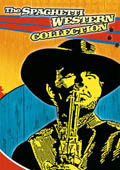
The Spaghetti Western Collection:
|
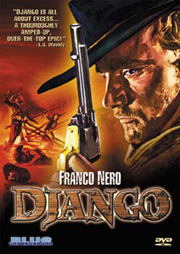
|
Django Image/Blue Underground 1966 / Colour / 1.66:1 anamorphic / 90 m. Starring Franco Nero, Loredana Nusciak, Jose Bodalo, Angel Alvarez, Eduardo Fajardo, Jimmy Douglas, Simon Arriaga, Ivan Scratuglia Cinematography Enzo Barboni Production Designer Giancarlo Simi Film Editors Nino Baragli, Sergio Montanari Original Music Luis Enriquez Bacalov Written by Sergio Corbucci, Bruno Corbucci, Piero Vivarelli and Franco Rossetti Produced by Manolo Bolognini Directed by Sergio Corbucci |
There's no denying that the basic structure of Django is built around key elements lifted from Sergio Leone's A Fistful of Dollars. But these elements are presented in a much darker and more nihilistic way, and are soaked in an air of gothic excess that gives the film its own skewed identity. Everything here is pushed to the max. If the Man With No Name can take down four or five bad guys in one go, Django, with his machine gun, will take down thirty. If the Man With No Name spends several weeks recuperating from his injuries before being forced to face his foes, Django will be forced to confront his enemies within hours of being injured. If the Man With No Name foregoes the opportunity to pilfer government gold, Django will jump at such an opportunity. Etc, etc.
Likewise, the conflict between the two gangs is staged at a much more intense level. This conflict is no petty business rivalry. It's part of a vicious race war instigated by Jackson, who spends most of his shocking introductory scene shooting Mexican peons for sport until he becomes bored and deigns to let one of his men have a turn. A later scene where Jackson's men silently advance upon the town with malevolent intent, their faces hidden by red hoods, creates a real feeling of dread and unease. But the Mexicans have their moments too. Hugo's way of dealing with an eavesdropping snoop caused outrage when Quentin Tarantino included a personal homage to it in 1992's Reservoir Dogs, so it's little wonder that Django had England's 1960s censors in a flap.
Alas, the censors weren't the only obstacle standing between Django and a receptive English-speaking audience. The film was saddled with one of the most unconvincing and poorly translated English dub jobs of the entire genre. This is no longer a problem because this DVD includes the film's original Italian dialogue track with optional (and accurately translated) English subtitles. Django packs a lot of action into its 90 minutes. It's a little rough around the edges in places but it looks and plays remarkably well considering its small budget. Corbucci's direction is pretty good here and he gets some great performances from his well-cast actors. Luis Enriquez Bacalov's superb soundtrack score is the icing on the cake.
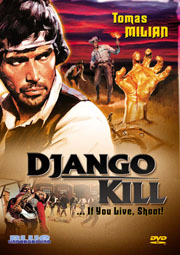
|
Django Kill Image/Blue Underground 1967 / Colour / 2.35:1 anamorphic / 117 m. / Se sei vivo spara Starring Tomas Milian, Marilu Tolo, Roberto Camardiel, Piero Lulli, Raymond Lovelock, Patrizia Valturri, Milo Quesada, Paco Sanz, Miguel Serrano, Angel Silva Cinematography Franco Delli Colli Production Designer Enzo Bulgarelli Film Editor Franco Arcalli Original Music Ivan Vandor Written by Giulio Questi and Franco Arcalli Produced by Renato De Pasqualis, Alex J Rascal and Angel Roson Directed by Giulio Questi |
Forget any preconceptions that you might already hold about the genre because this film tears up the rule book and starts again from scratch. In many ways it plays like a typically strange, sub-psychedelic, slightly surreal, late 60s European art film that just happens to be set in the Spaghetti West. Alex Cox noted that parts of it resemble a Mario Bava horror film. And if David Lynch ever dreams about Western towns they surely resemble 'the Unhappy Place'. In one totally convincing and particularly unnerving sequence a gang of hardened outlaws literally go to pieces as they nervously edge into town and observe the strange and unsettling day to day behaviour of the bizarre locals. Ultimately, some disturbing scenes follow when the townsfolk turn on their visitors. And that's just the start of a relentless onslaught of shocking and brutal scenarios that detail the dark side of human nature: uncontrollable greed, sadistic cruelty and unbridled lust. Questi really piles on the misery in the film's final chapter, which contains some very graphic violence. Even the Italian censor felt the need to have a pop at this title.
This is an interesting outing for Tomas Milian. His Spaghetti Western characters are usually loud, animated and uncouth individuals, intensely portrayed with a fiery sense of passion. Here he is as laid back as can be. Quiet and contemplative because of his near-death experience or tripping out on the medication supplied by the two spiritual Indians who nursed him back to health? It's hard to say but the Stranger is a changed man and an untypical Spaghetti Western anti-hero. His vengeance against the man who tried to kill him leaves him cold. He feels pity for his unfortunate former partners. He's no longer interested in dollars or gold. He recognises that there are two good people in town that he should try to save but he remains too unfocussed to fully motivate himself. Repeatedly washing his hands, as if he believes that this action will divorce him from misdeeds in the past or responsibilities in the present, seems to be the only activity that he carries out with any conviction.
There's some interesting cinematography on display here and much of it chooses to ignore the genre conventions laid down by Leone and company. The Stranger's delirious flashbacks are particularly striking: they're montages which fuse together a rapid succession of wild shots that can't be much longer than three or four frames in length. Sections of Ivan Vandor's interesting soundtrack score are quite unusual, featuring a heavy reverb effect which adds to the film's trippy vibe. Many of the supporting actors appear to be non-professionals and this serves to give the proceedings a disturbingly realistic edge. A cult movie in a cult genre is how Tomas Milian describes this strangely atmospheric and unsettlingly unique production.
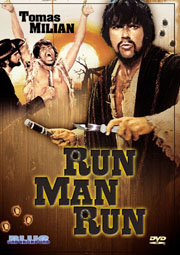
|
Run Man Run Image/Blue Underground 1968 / Colour / 2.35:1 anamorphic / 121 m./ Corri, uomo, corri Starring Tomas Milian, Donald O'Brien, Linda Veras, Chelo Alonso, Marco Guglielmi, Jose Torres, Luciano Rossi, Nello Pazzafini, John Ireland, Gianni Rizzo Cinematography Guglielmo Mancori Art Director Franco Cuppini Film Editor Tatiana Casini Morigi Original Music Bruno Nicolai Written by Sergio Sollima and Pompeo De Angelis Produced by Aldo Pomilia Directed by Sergio Sollima |
Sergio Sollima's other genre entries, The Big Gundown and Face to Face are undisputed classics and they are both said to have serious political messages allegorically encoded within their narratives. Sollima employs a different technique for the presentation and dispersal of his political observations in Run Man Run: firstly, the film plays for laughs, presumably an attempt to connect with a wider audience base; secondly, in keeping with the semi-comedic approach, rather than communicating his political ideas symbolically, Sollima imparts most of them as directly as possible, usually via the dialogue spoken by the film's characters. Some of the political satire works well (Cuchillo warning Dolores that Ramirez is "a very dangerous poet", etc.) but the film doesn't always find the laughs that it's looking for. Mind you, I found around four or five laugh-out-loud moments here and that's actually pretty good going for a semi-comedic Spaghetti Western.
This film is Cuchillo's second outing and the character has undergone something of a slight makeover here. In The Big Gundown he was feral, slippery and extremely dangerous when cornered, and proved to be a real handful for Lee Van Cleef. Here he's a slightly 'softer' proposition: he's very much a victim of circumstance who is propelled along by the actions of others. His reactions to some of the situations that he unexpectedly finds himself in vaguely bring to mind Malcolm McDowell's Mick Travis character in Lindsay Anderson's O Lucky Man!. We only really see the 'old' Cuchillo in the film's final fifth when the chase comes to an end and he has to stand and fight. Strangely enough, the good (but not outstanding) score by Ennio Morricone/Bruno Nicolai (there's some dispute as to which of the partners actually signed this one) only really starts consistently hitting the mark in the film's final fifth too, when it chooses to echo familiar phrases from The Big Gundown's superior score.
Donald O'Brien is good as Cassidy, who comes on like a mix of the Lee Van Cleef and William Berger characters from Sollima's earlier genre outings, and it's refreshing to come across a less familiar face in this kind of role. But, overall, Run Man Run is maybe just a little too episodic in its approach, possibly suffering from having too many characters involved in the chase. And the humour employed doesn't always suit the Cuchillo character. Milian states that he tried to take on the physical characteristics of a hunted rabbit during parts of the shoot and laments that most of his efforts in this direction were lost at the editing stage: consequently, the bits that do remain seem noticeably odd. Having said that, it's still a pretty enjoyable film, boasting some good cinematography and some great action set-pieces, and it's a real treat to have it presented as impeccably as it is here.
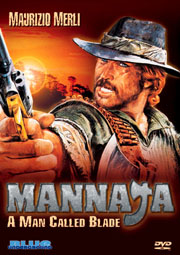
|
Mannaja Image/Blue Underground 1977 / Colour / 2.35:1 anamorphic / 96 m. Starring Maurizio Merli, John Steiner, Sonja Jeannine, Donald O'Brien, Philippe Leroy, Martine Brochard, Salvatore Puntillo, Nino Casale, Enzo Fiermonte, Rick Battaglia Cinematography Federico Zanni Production Designer Giacomo Calo Carducci Film Editor Eugenio Alabiso Original Music Guido and Maurizio De Angelis Written by Sergio Martino and Sauro Scavolini Produced by Luciano Martino Directed by Sergio Martino |
An unexpected treat for every genre fan who ever stumbled across it, Mannaja is the film that proved that it was still possible to make a decent and satisfyingly traditional Spaghetti Western in 1977. After half a decade of mainly inane and frustratingly eccentric and silly comedy Spaghetti Westerns, this film cut through the chaff, boasting a deadly serious storyline and proudly displaying the influences of Leone and Corbucci. This is no-nonsense, old school Spaghetti Western action coupled with the harder edged outlook of late 1970s Italian cinema. Basically, it's a tale with a Django-esque feel (the gothic ambience, the muddy ghost town, the troupe of good-time girls, etc) that is enhanced by Once Upon a Time in the West-style flashbacks which slowly reveal the motive behind Blade's vengeance. Not only that, director Sergio Martino does a pretty good job of quite naturally recreating the atmosphere and the cinematic conventions of the classic genre films of the 1960s. In addition to this, some Sam Peckinpah-style slow-motion photography is applied to some of the film's action sequences to good effect.
There's also some decent acting on display, with Maurizio Merli acquitting himself well as an ecologically aware Spaghetti Western anti-hero and John Steiner making the aloof Voller a suitably nasty villain. There was a vogue in the mid 1970s for Spaghetti Westerns to have 'narrative soundtracks': a suite of songs whose lyrics described the onscreen action. The kings of the narrative soundtrack were the De Angelis brothers and their work is present here. Be warned, it's a bit of an acquired taste: if you can imagine Captain Beefheart singing Leonard Cohen, then you're part way there (I actually don't mind it, myself). Suffice to say, Mannaja made such a lasting impression on jaded genre fans that it came to represent a kind of symbolic coda for the genre itself (although other Spaghetti Westerns have appeared since) and it makes for a rather fitting way to round off this collection.
The advent of the digital age hasn't yet altered the Spaghetti Western fan's position as the poor cousin of genre-dom. There are still relatively few Euro Westerns available on DVD and those that do get a release rarely get the full restoration treatment that they deserve. That makes the content of these discs from Blue Underground all the more remarkable. Each film is uncut and has been mastered from the best available Italian film elements and the results are largely excellent. Unfortunately, the negative used for the Django disc has suffered some age related damage and this results in some light but noticeable 'contrasty' blotches intermittently appearing throughout the film: these don't affect picture stability, etc, and the picture quality at its best remains quite superb. Likewise, the Mannaja print used here has one or two sequences that play just a little on the worn side when compared to the bulk of the feature.
The welcome extras are fairly generous too: each disc features a pertinent featurette/mini documentary (all of which include recent interviews with the relevant personnel), a theatrical trailer, an image gallery, pertinent talent bios and a four page booklet containing liner notes. Although each film is presented in English, the original Italian dialogue track is also available for selection along with optional English subtitles. The Run Man Run disc also features the film's Italian title sequence and Westerns Italian Style, a slightly cheesey but fun and interesting - and incredibly rare - 38 minute documentary narrated by genre stalwart Frank Wolff. Each title (with the exception of Django) can be bought separately.
The content of this collection does a pretty good job of capturing the basic essence of the genre but it is, of course, impossible with just four films to fully represent a film movement that spanned decades and generated over 600 titles: it would take the issue of several more box sets like this to do that. Hmm, volume two featuring Sartana, The Price of Power, Face to Face and Buddy Goes West supported by the America in Rome documentary sounds good to me.
On a scale of Excellent, Good, Fair, and Poor,
Django, Django Kill, Run Man Run and Mannaja
rate:
Movie: Django: Excellent - Django Kill: Very Good -
Run Man Run: Good ++ Mannaja: Very Good +
Video: All pretty much Excellent (see note above re: Django and Mannaja)
Sound: All Very Good
Supplements: See above
Packaging: Four keep cases in a card box
Reviewed: January 26, 2003
Review Staff | About DVD Talk | Newsletter Subscribe | Join DVD Talk Forum
Copyright © MH Sub I, LLC dba Internet Brands. | Privacy Policy | Terms of Use
|
| Release List | Reviews | Price Search | Shop | SUBSCRIBE | Forum | DVD Giveaways | Blu-Ray/ HD DVD | Advertise |





